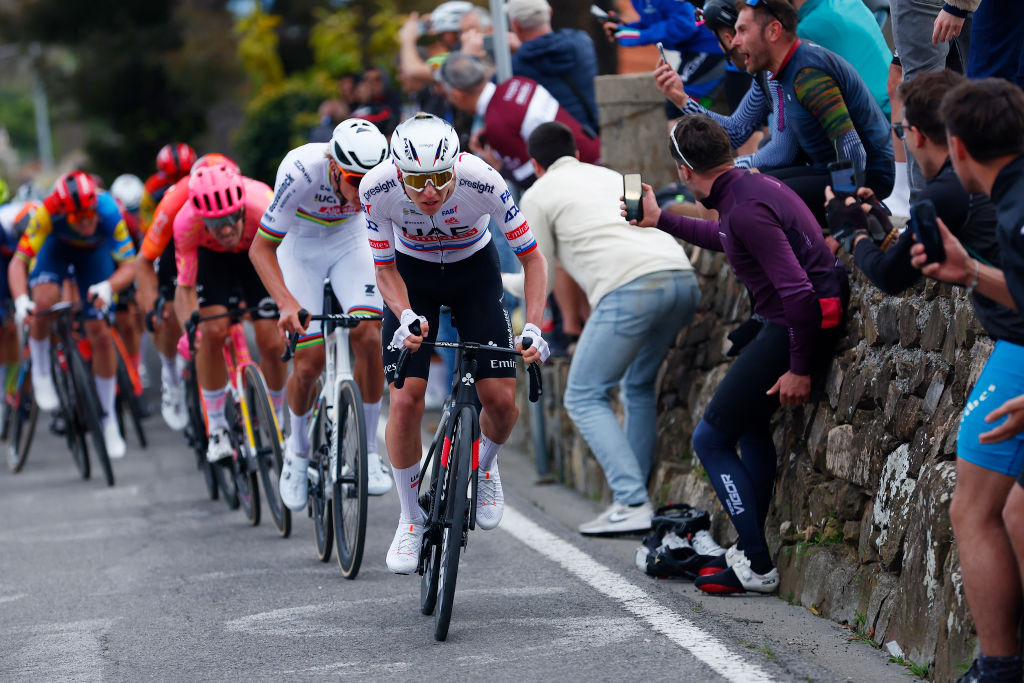Having finished in fourth place at Milano-Sanremo in 2023, many put Tadej Pogačar as their favourite to win the first Monument of the season after his victory in his first race of the season at Strade Bianche a couple of weeks ago.
However, despite attacking twice on the Poggio after his UAE Team Emirates teammates drilled it on the front of the peloton on the final two climbs, Pogačar was unable to make any real impact on the race, as he failed to get away in the closing kilometres.
There had been talk ahead of the race that the Slovenian would attack on the Cipressa, but with so many riders still in the front group at that stage of the race, it would have been a tactical disaster to have gone on the offensive on the penultimate climb.
When he attacked for the first time on the Poggio, he was unable to distance last year’s winner Mathieu van der Poel, with Filippo Ganna and Alberto Bettiol also able to follow the move.
He did get a sizeable gap with his second attack though, as Van der Poel found himself out of position and unable to follow initially. He was able to attack across the gap though and bridge over to the Slovenian rider with relative ease.
Pogačar did have the option to work with the Dutchman on the descent of the final climb, but decided against it due to fear of dragging him to the line. When other riders joined them on the descent it was clear that Pogačar had resigned himself to trying his luck in the sprint.
After a late attack by Matteo Sobrero and the subsequent counter-attack by Tom Pidcock was brought back, Pogačar put himself in a good position for the final sprint, but was forced to settle for third, as he was unable to contest the victory against Jasper Philipsen and Michael Matthews.
In a post-race interview, Pogačar gave his assessment of the race, as he stated that “we had a plan, we stuck to it. We missed little bits, just like ten percent on Cipressa and after, so in the end the team just had to wait too long on the Poggio, so it was not too hard and I tried with two attacks. I had incredible legs, but this year was not hard enough to be a climber’s race”.
Although his third place finish was an improvement on his result from last season, Pogačar is a winner and will be naturally disappointed having not taken the victory. On his feelings regarding his result, Pogačar said “I did everything I could. To be third place in this situation, I could not have done much better, but it was close”.
This edition of Milano-Sanremo was the fastest in the race’s history, with an average speed of 46.1km/h over the six and a quarter hours of racing. However, Pogačar seemed unphased by this, as he said “I don’t know, I think today was one of the easiest races ever. We rode a super easy tempo for the first few hours, but as I said before the race, everything has to be perfection and today everything was not perfect, but we did really good and I think a podium was the best we could do”.
In a season where he is clearly motivated to accomplish big things in the sport, Pogačar looks to be in some of the strongest form we have ever seen him in, as he looks ahead to the rest of his Spring Classics campaign and his attempt at the Giro-Tour double later in the year.
It is also clear that he has unfinished business at this race and he will almost certainly be back next year in an attempt to take that elusive victory and add it to his palmarès. For Pogačar to succeed at Milano-Sanremo, it is clear that the race needs to be much more attritional than it was today and perhaps a rainy edition would suit him better given his adeptness at racing in cold and wet conditions.


















